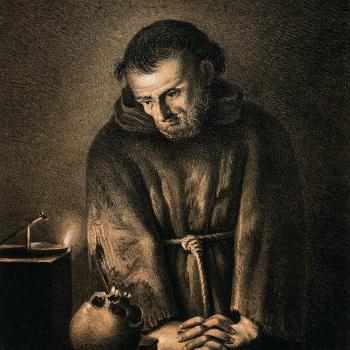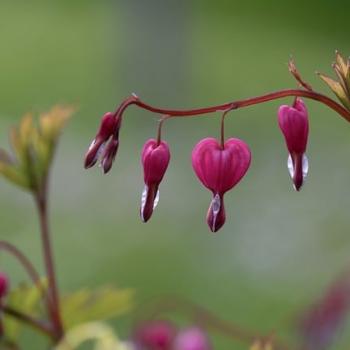By Christopher Copeland
 Growing up, I was not close with my grandmother. Certainly I spent time with Runey, my mother's mother, but she was not the kind of grandmother who welcomed you into her bosom. Runey kept a clean and well-ordered house and as a good Southern Baptist woman, lived her life anxious about presenting the proper image. Only once do I remember her laughing when we were together. That was when she was alive.
Growing up, I was not close with my grandmother. Certainly I spent time with Runey, my mother's mother, but she was not the kind of grandmother who welcomed you into her bosom. Runey kept a clean and well-ordered house and as a good Southern Baptist woman, lived her life anxious about presenting the proper image. Only once do I remember her laughing when we were together. That was when she was alive.
Upon her death, Runey and I became very close. Preparing the eulogy for her funeral, I struggled to find a scripture text to ground my reflection about her life. I went to bed the night before the church service unsure what I would say to her family and friends the next day. I woke up early the next morning with an image and a story.
At the wake the prior evening, as my family stood around and told stories, I was struck by the picture that had been chosen for the funeral parlor room. Taken at the 50th wedding anniversary celebration of Runey and my grandfather, she was holding a glass of what appeared to be champagne. Of course, she was quick to tell everyone who approached that she was a Christian and didn't drink alcohol. It was sparkling grape juice, she assured everyone. This image led me to the story of Jesus' first miracle -- turning the water into wine at the wedding in Cana.
The reflection that I offered to gathered loved ones later that morning was that of Runey entering heaven in the midst of great celebration. Jesus had turned the foot-washing water into the finest of wines and was welcoming everyone as they joined the festivities, handing them a glass of wine. As Runey approached, Jesus greeted her with abundant love and offered her a glass of wine. "I don't drink alcohol," she said. "I'm a Christian." Jesus chuckled and smiled as he assured her that they would find some sparkling grape juice around there somewhere.
As a twenty-nine-year-old who had never experienced a significant death, I hadn't given much thought to the idea of afterlife. Sure, my seminary training had encouraged me to explore the scripture and theological understandings of heaven and hell, salvation, and life after death, but it had all been theoretical thinking. Now in midlife having known many losses, my ideas of afterlife have shifted. In fact, I don't think much about the afterlife these days. What I know now more than ever is that what happens after life is mystery.
The term afterlife assumes that there is an existence that occurs after this life as we know it is over. I wonder then what exactly life is, what it means to be alive. My sense is that to be alive is to be attentive to the beauty, love, and compassion that exist all around us all the time. To be alive is to recognize that we are connected to all of God's creation with no separation. When our physical bodies cease to function -- our hearts stop, our minds quiet, our muscles release -- we are still alive just as we were alive before we took on our current physical form. We have forever been alive, we are always alive, and we will be alive for all time because we are a part of God, a part of everything.
I prefer to think of life as a grand whole in which there is no separation between former life, current life, and after life. Life is a great arc of remembering who we are, one reflection of the divine mystery that is Love.
About five years after my grandmother's death, I was praying with angst and insecurity about an upcoming discipleship class that I was to create and teach to the young people of my congregation. During the prayer I was flooded with the image of Runey's house, still in good order. As I walked down the familiar hallway and approached the kitchen, I saw her sitting at the oval table sipping a cup of coffee. Rising to greet me, Runey gave me a warm smile and a deep embrace. As I looked her in the eyes, this former schoolteacher placed her hands on mine and said, "I give to you, Chris, my gift of teaching." Tears filled my eyes. And then she added, "I spent my entire life worrying about what others thought of me and I never really lived my own life. Don't worry with what people think of you, Chris. Go and live."
As one of the saints in the great cloud of witnesses, Runey has taught me that life after death is just life, and that we are even more connected to all of life than we often realize. Runey also reminds me, echoing the words in Deuteronomy, that set before us today is life and death. Go and live.
 Ordained in 1997 at Oakhurst Baptist Church in Decatur, Georgia, Chris Copeland has served as pastor, youth minister, church consultant, retreat leader, denominational representative, and spiritual director. Chris returned to his roots in 2009 with a move to Durham, North Carolina, where he serves as the director of Illuminating Paths, a practice of accompanying individuals, groups, and communities on their spiritual journeys using the tools of rituals, embodiment, spiritual practices, and discernment.
Ordained in 1997 at Oakhurst Baptist Church in Decatur, Georgia, Chris Copeland has served as pastor, youth minister, church consultant, retreat leader, denominational representative, and spiritual director. Chris returned to his roots in 2009 with a move to Durham, North Carolina, where he serves as the director of Illuminating Paths, a practice of accompanying individuals, groups, and communities on their spiritual journeys using the tools of rituals, embodiment, spiritual practices, and discernment.
Through the work of Illuminating Paths, Chris consults with congregations and ecclesial bodies, leads retreats and workshops, and provides individual and group spiritual direction. Chris also serves as a member of the leadership team of the Alliance of Baptists, a movement of progressive Christians seeking to respond to the continuing call of God in a rapidly changing world.
2/9/2010 5:00:00 AM




